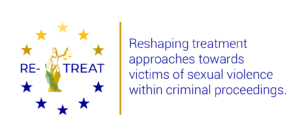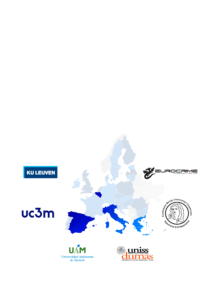The RE-TREAT PROJECT

The RE-TREAT Project – Reshaping treatment approaches towards victims of sexual violence within criminal proceedings
The Directive 2012/29/EU establishes the rule of an individual assessment for all victims of crime in all the EU Member States, considering the personal characteristics of the victim and the nature and special features of the crime, expressly mentioning sexual violence.
Numerous NGOs representing victims report negative experiences in dealing with the criminal justice system, such as stressful and aggressive cross-examination of the victims in courts, unwanted encounters with defendant, their families and friends, or the use of the personal sexual history of the victim by the prosecution or the defendants’ lawyers in sexual offence cases and trials.
The conclusions of the Council of Europe hearing on “Access to Justice for Women Victims of Violence” on 9 December 2013 emphasised that in criminal proceedings, procedures are lengthy; there are high levels of conflict, corruption, low conviction rates and discriminatory practices that result in serious barriers for women victims of violence seeking justice.
Moreover, victims of sexual crime are often re-victimised by justice systems that do not adequately address their rights and needs. Capacity building and focused training in dealing with victims of sexual crimes for practitioners and field professionals are still insufficient. The overall aim of the RE-TREAT project is to boost procedural and organisational changes in the field of criminal proceedings within the justice systems in Spain, Italy and Greece in order to improve their responsiveness to the needs of the victims of sexual crimes.
The EU funded project “RE-TREAT – Reshaping treatment approaches towards victims of sexual violence within criminal proceedings” started on the 3rd February 2020, and it will last 24 months.
The “Carlos III” University of Madrid (Spain) leads the project, in partnership with
- EuroCrime – Research, Training and Consulting SrL (Italy),
- Autonomous University of Madrid (Spain),
- Union of Women Members’ Associations of Heraklion Prefecture – UWAH (Greece),
- Catholic University of Leuven (Belgium),
- University of Sassari (Italy).


Work planned & main outcomes
- Analysis of barriers, harmful practices, and potential solution regarding the treatment of victims of sexual crimes during the criminal proceedings,
- Identification of the best practices in the field,
- Development of recommendations on adopting procedural codes regarding in particular the treatment of victims of sexual crimes during criminal proceedings,
- Development of a Training Manual and training activities for professional and practitioners within the justice systems,
- Raising awareness among actors dealing with the phenomenon.
Results & impacts
- Identified barriers and pain-points faced by victims of sexual crimes within criminal justice system in Spain, Italy, and Greece,
- Increased capacity of at least 270 criminal justice practitioners in the abovementioned three Member States, to grant appropriate treatment for victims of sexual crimes,
- Improved public awareness and knowledge about the right of victims of sexual crimes in Spain, Italy, and Greece, and at the EU level.
Follow the project at the following link in order to be informed on its achievements and progress:
httpss://sexualviolencejustice.eu/re-treat-project/
And follow us on the RE-TREAT blog: httpss://sexualviolencejustice.eu/blog/
You can download the project newsletter here:
Newsletter #1: httpss://mailchi.mp/f63b0432f0b6/re-treat-eu-project-first-newsletter
Newsletter #2: httpss://mailchi.mp/33d5bb14f44d/re-treat-eu-project-newsletter-no-2

The RE-TREAT Project is co-funded by the European Union Justice Program (2014-2020)
Grant Agreement: 878566 — RE-TREAT — JUST-AG-2019/JUST-JACC-AG-2019
The content of this web represents the views of the author and is his/her sole responsibility. The European Commission does not accept any responsibility for use that may be made of the information it contains.

